pew research center
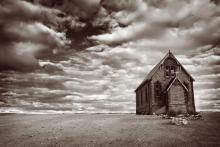
Let’s be clear: The much-heralded “decline of Christianity in America” isn’t about God losing faith in humankind.
It isn’t about losing our moral compass thanks to whatever you happen to loathe. It isn’t about fickle millennials. It isn’t about zigging trendy or zagging traditional.
In fact, I would argue that Christianity isn’t in trouble at all. Churches are in trouble. Denominations are in trouble. Religious institutions like seminaries are in trouble. Professional church leaders are in trouble.
But churches can’t hold God hostage.
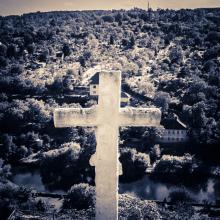
It’s important to listen to the stories told through the numbers as well as the untold stories. As a non-American, it is surprising to hear my brothers and sisters throw out phrases like, “the church is in decline,” when what you are referring to is the church in America. The global church is alive and well and thriving in many areas of the world, and what joy it would be to allow their voices to speak into the congregations of the global North. Many of the polarizing, divisive issues in the American church, such as gay marriage, abortion, and the death penalty, are being discussed by the global church outside the context of the binary lenses of the American left and right. These outside voices can serve to soften the rhetoric hurled by each side, and also give perspective to the priority placed on them in light of the problems faced by the global South.
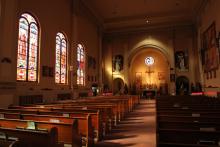
The United States is a significantly less Christian country than it was seven years ago.
That’s the top finding – one that will ricochet through American faith, culture, and politics – in the Pew Research Center’s newest report, “America’s Changing Religious Landscape,” released May 12.
This trend “is big, it’s broad, and it’s everywhere,” said Alan Cooperman, Pew’s director of religion research.

Most Americans who know about the deadly attack on the Paris headquarters of the satirical Charlie Hebdo magazine say it’s OK that the weekly featured cartoons of the Prophet Muhammad.
A new survey from the Pew Research Center shows 76 percent of Americans know of the Jan. 7 attack, and among this group 60 percent of Americans support the magazine’s right to publish these controversial images, while 28 percent disapprove.
However, one in four Americans overall offered no opinion because, they said, they had not heard about the violent attack where 10 artists and writers and two policemen were murdered.
The survey of 1,003 U.S. adults was conducted Jan. 22-25, two weeks after the attack. It has a margin of error of plus or minus 4.7 percentage points in the portion of the report that deals only with those who said they had heard about the incident.
The survey looked more closely to see how members of this group explained their views.

Reading religion surveys can seem like confronting the Tower of Babel: stacked questions, confusing terms, unscientific methodology.
It gets even crazier when results are contradictory. How does that happen?
Some surveys lean like the Tower of Pisa
The Pledge of Allegiance is a perfect example.
There’s almost always a flap over how many Americans do — or don’t — want the words “under God” kicked out of the Pledge of Allegiance. Indeed, on Nov. 19 a court in Monmouth, N.J., will hear the case of the American Humanist Association battling the Matawan-Aberdeen Regional School District to have schools edit out mention of God.
The humanists claim 34 percent of Americans agree with their view. But, wait. What about a survey conducted earlier this year by LifeWay Research, a Christian research agency? It found that only 8 percent would cut God from the Pledge.
Why four times the difference? Look to the poll language.
LifeWay asked: “Should the words ‘under God’ be removed from or remain in the Pledge of Allegiance to the United States of America?” That’s a straight-up question with no preface.
The humanists’ survey, however, began with a bit of pointed Pledge history — before getting to the (loaded) question:
“For its first 62 years, the Pledge of Allegiance did not include the phrase ‘under God.’ During the Cold War, in 1954, the phrase ‘one nation, indivisible … ‘ was changed to read ‘one nation, under God, indivisible … ‘. Some people feel this phrase in our national pledge should focus on unity rather than religion.
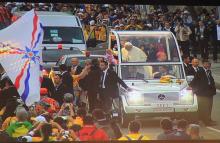
In just one generation, Latin America has seen the number of people who identify themselves as Catholic plummet, with more people becoming Protestant or dropping religion altogether, a new report shows.
The shift is dramatic for a region that has long been a bastion of Catholicism. With more than 425 million Catholics, Latin America accounts for nearly 40 percent of the global Catholic population. Through the 1960s, at least 90 percent of Latin Americans were Catholic, and 84 percent of people surveyed recently by the Pew Research Center said they were raised Catholic.
But the report released Nov. 13 found that only 69 percent of Latin Americans still consider themselves Catholic, with more people switching to more conservative Protestant churches (19 percent) or describing themselves as agnostic or religiously unaffiliated (8 percent).
Even last year’s election of an Argentine as pope to head the Catholic Church has led to conflicting feelings in Latin America.
“While it is too soon to know whether (Pope) Francis can stop or reverse the church’s losses in the region, the new survey finds that people who are currently Catholic overwhelmingly view Francis favorably and consider his papacy a major change for the church,” the report said. “But former Catholics are more skeptical about Pope Francis. Only in Argentina and Uruguay do majorities of ex-Catholics express a favorable view of the pope.”
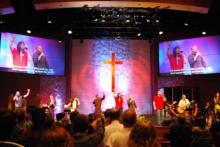
God bless online media. Almost half of U.S. adults (46 percent) say they saw someone sharing “something about their faith” on the Internet in the last week.
And one in five (20 percent) say they were part of the Internet spiritual action on social networking sites and apps — sharing their beliefs on Facebook, asking for prayer on Twitter, mentioning in a post that they went to church.
“The sheer number of people who have seen faith discussed online is pretty striking,” said Greg Smith, associate director of religion research for Pew Research Center.
Megachurch pastors have mega-followings online. Joel Osteen of Lakewood Church streams his Houston services online. Rick Warren of Saddleback Church has 1.8 million likes on his Facebook page. And Pope Francis has more than 4.6 million English-language followers, chiefly American, for his @Pontifex Twitter feed.
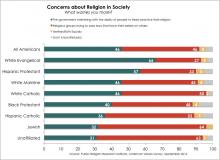
These are anxious times for white evangelicals, according to two new surveys.
At 20 percent of U.S. adults, they are statistically neck-and-neck with the “nones” — people who claim no religious brand. “Nones” now tally up to 19 percent in the 2014 American Values Survey, said Robert Jones, CEO of the Public Religion Research Institute, which released the survey Sept. 23.
Evangelicals, said Jones, are on “the losing side of the culture wars, such as gay marriage, and they see that their share (of society) is shrinking and aging, adding to their sense of being embattled.”
“They can no longer say confidently they speak for all people of faith.”
Perhaps for that reason, white evangelicals, more than any other religious group, worry that the government will interfere with their religious liberty.
The survey asked which concerned people more: The government interfering with their ability to “freely practice their religion” or “religious groups trying to pass laws that force their beliefs on others.”
The overall answer was a tie — 46 percent of Americans overall for each viewpoint. But white evangelicals were significantly more worried about government interference (66 percent) than any other group.

More Americans today say religion’s influence is losing ground just when they want it to play a stronger role in public life and politics.
A new Pew Research Center survey finds 72 percent of Americans say religion’s influence is declining in society — the highest percentage since Pew began measuring the trend in 2001, when only 52 percent held that view.
“Most people (overwhelmingly Christians) view this as a bad thing,” said Greg Smith, associate director of Pew’s Religion & Public Life Project. “That unhappiness may be behind their desire for more religion and politics.”
Growing numbers want their politicians to pray in public and for their clergy to endorse candidates from the pulpit. And nearly half of Americans say business owners with religious objections to gay marriage should to be able to refuse wedding-related services to same-sex couples.
There are three ways to look at the findings, released Sept. 22:
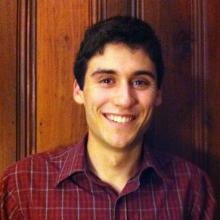
According to a new survey, white evangelical Christians feel a lot of warmth toward Jews.
As for Jews, they feel colder toward evangelical Christians than they do about any other religious group.
Cue the Taylor Swift ballads: We have here a serious case of unrequited love.
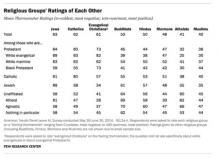
A new Pew Research survey finds U.S. adults feel most warmly about people who share their religion or those they know as family, friends or co-workers.
Americans give their highest scores to Jews, Catholics, and Evangelicals on a zero-to-100 “thermometer” featured in the survey, “How Americans Feel about Religious Groups,” released Wednesday. They’re nestled within a few degrees of each other: Jews, 63; Catholics, 62; evangelicals, 61.
In the middle of the chart: Buddhists, 53; Hindus, 50; Mormons, 48. Trending to the chilly negative zone: atheists at 41 and Muslims at 40.
Pew took the thermal reading because “understanding the question of how religious groups view each other is valuable in a country where religion plays an important role in public life,” said Greg Smith, Pew’s associate director of religion research.
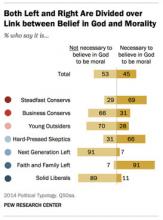
Toss out the party and ideology labels: Republican, Democrat, conservative, liberal.
The Pew Research Center’s new survey, “ Beyond Red VS Blue: The Political Typology,” finds no sharp lines dividing people by their views on politics, faith, family, and the role and limits of government.
“It’s a spectrum,” said Michael Dimock, vice president for research for Pew Research Center.
Looking at questions relating to faith and family, he observed, “the caricature that all religious people are Republican is just not true.”
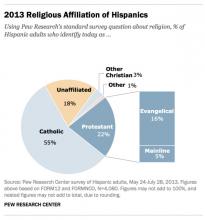
The Pew Research Center’s look at “The Shifting Religious Identity of Latinos in the United States” also examined their beliefs, behavior, and views on social issues. It finds that, beyond the church doors in the lives of the faithful, there are distinct differences between Hispanic evangelicals and Hispanic Catholics:
Catholics are less likely than evangelicals to:
- Attend services weekly — Catholic, 40 percent; evangelical, 71 percent
- Pray daily — Catholic, 61 percent; evangelical, 84 percent
- Take a literal view of the Bible — Catholic, 45 percent; evangelical, 63 percent
- Think abortion should be illegal in all/most cases — Catholic, 54 percent; evangelical, 70 percent
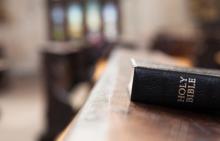
The Bible encourages the “repression of women,” and it’s silent on such fraught topics as war or slavery.
The American Bible Society’s annual “State of the Bible” survey reveals “the people of the book are not people of this book,” said Geof Morin, chief communication officer for the society.
“We know 88 percent of people say they have a Bible. They think: ‘I have a Bible. I have had one for a long time. I must know what’s in it.’ But people overestimate their knowledge,” Morin said.
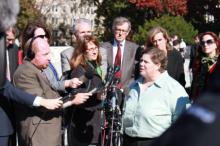
The U.S. Supreme Court will soon rule on the constitutionality of prayer at public meetings. But a new survey finds U.S. voters clearly favor prayer – as long the public prayer is generic and not specifically Christian.
A Jew and an atheist brought suit in Greece, N.Y., saying the Christian prayers excluded many citizens and violated the Constitution, which bans government establishment of religion. Even when the town began inviting non-Christians to give invocations, the “establishment” issue remained a question.
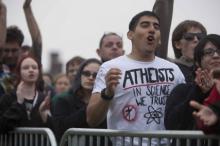
In recent surveys, the religious “nones” — as in, “none of the above” — appear to lead in the faith marketplace. In fact, “none” could soon be the dominant label U.S. adults pick when asked to describe their religious identity.
And, researchers say, this is already making nones’ attitudes and opinions less predictably liberal on social issues.

Global religious hostilities reached a six-year high in 2012 and affected more people than government curbs on religious freedom, according to the Pew Research Center’s latest report on religious restrictions around the world.
The report, released Tuesday ahead of National Religious Freedom Day on Thursday, shows that 74 percent of the world’s population experienced high levels of social hostility toward religion, up from 52 percent in 2011.
The sharp rise is due to hostilities in China, which for the first time in the survey’s six-year history, scored a “high” level of religious strife. Home to more than 1.3 billion people, China experienced an increase in religion-related terrorism, mob violence and sectarian conflict in 2012.
The greatest levels of social hostilities toward religion were felt in Pakistan, Afghanistan, India, Somalia, Israel, and Iraq, according to the report.
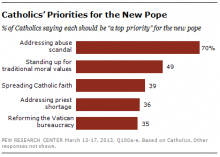
Pope Francis is creating a special commission to deal with the clergy sexual abuse crisis on a global scale, a step that comes amid growing criticism that Francis had not given sufficient attention to the scandal.
Boston Cardinal Sean O’Malley made the announcement on Thursday in the Vatican where he was meeting this week with Francis and the other members of the so-called “Gang of Eight” cardinals that the pope chose to help him reform the Roman Curia.
O’Malley, who is the U.S. bishop with perhaps the most credibility on the abuse issue, listed a range of programmatic ideas for the commission, whose members are expected to include lay people, mental health professionals, and other experts in the field as well as leading churchmen.

Death may be inevitable, but one in three Americans – including most blacks and Hispanics – want doctors to never quit fighting it.
And that number has nearly doubled in 23 years, a new survey finds.
In 1990, 15 percent of U.S. adults said doctors should do everything possible for a patient, even in the face of incurable illness and pain. Today, 31 percent hold that view, according to a report released Thursday by the Pew Research Center’s Religion & Public Life Project.
The majority of U.S. adults (66 percent) still say there are circumstances when a patient should be allowed to die. At the same time, however, the never-say-die view calling for nonstop aggressive treatment has increased across every religion, race, ethnicity, and level of education.

Asian-American Christians are voicing concerns over how they’re depicted by white evangelicals, most recently at a conference hosted by Rick Warren’s Saddleback Church in California.
Saddleback recently hosted a conference by Exponential, a church-planting group, and a video last Tuesday left some Asian-Americans offended.
It’s the second dust-up in as many months involving Asian-Americans and Warren, who spoke at the Exponential conference. Last month he received backlash from Asian-American Christians after he posted a Facebook photo depicting the Red Guard during China’s Cultural Revolution. “The typical attitude of Saddleback Staff as they start work each day,” the caption read on Sept. 23.